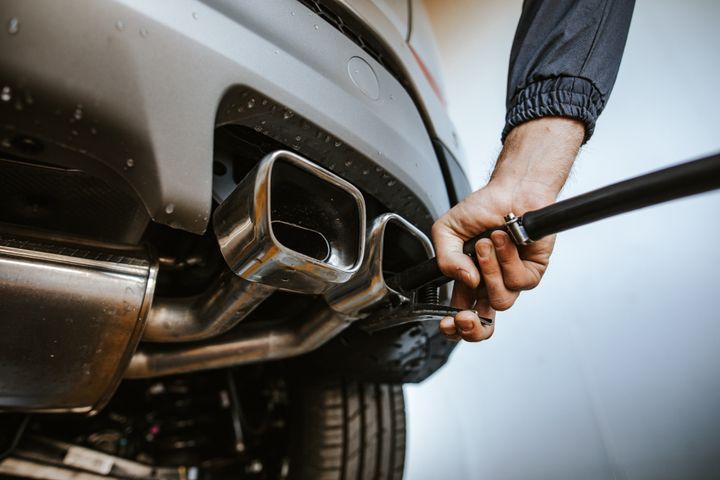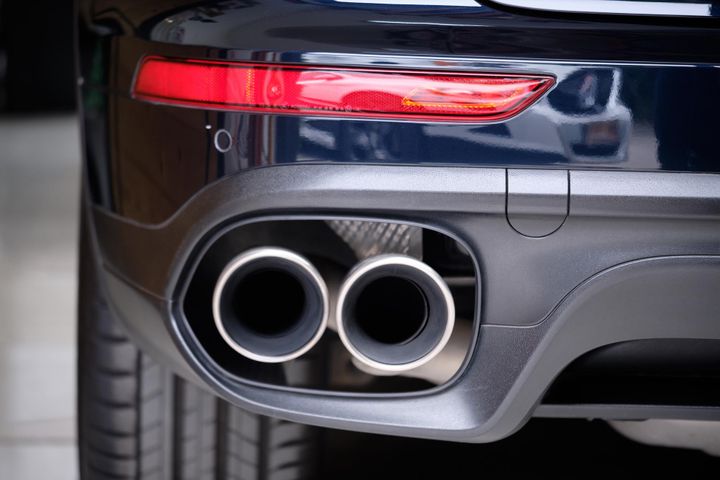


Exhaust tips are the visible part of a vehicle's exhaust system, typically located at the rear end of the car. They are often considered a cosmetic modification, but there is an ongoing debate about whether they can also affect the sound produced by the exhaust system. The exhaust note is an essential aspect of a car's character, and many enthusiasts seek to enhance or modify it to achieve a desired tone or volume.

Before we dive into the specifics of exhaust tips, it's crucial to understand the fundamental components of an exhaust system and their respective roles. The primary function of this system is to channel the exhaust gases produced by the engine's combustion process away from the vehicle's interior and into the atmosphere.
Here's a breakdown of the key components:
| Component | Function |
|---|---|
| Exhaust Manifold | Collects exhaust gases from the engine's cylinders and directs them into the exhaust piping. |
| Catalytic Converter | Reduces harmful emissions by converting pollutants into less harmful substances through chemical reactions. |
| Muffler | Dampens noise and vibrations generated by the exhaust gases, ensuring a quieter and smoother ride. |
| Resonator | Further reduces exhaust noise by canceling out specific sound frequencies. |
| Exhaust Piping | Transports the exhaust gases from the engine to the rear of the vehicle. |
| Exhaust Tips | The visible outlets at the rear of the vehicle, through which the exhaust gases are expelled into the atmosphere. |
Now, let's address the million-dollar question: Do exhaust tips change the sound of a car's exhaust? The short answer is: not significantly. Exhaust tips are primarily designed for aesthetic purposes, adding a touch of style and personality to a vehicle's rear end.
While exhaust tips can slightly alter the exhaust note due to their shape, size, and positioning, the most significant impact on exhaust sound comes from the muffler, resonator, and exhaust piping. These components are responsible for controlling the flow and resonance of the exhaust gases, ultimately shaping the auditory experience.
If you're experiencing unusual noises or performance issues related to your exhaust system, it's crucial to inspect and identify the root cause. Here are some telltale signs to look out for:
Loud Roaring or Hissing: These sounds may indicate a leak or damage in the exhaust system, allowing exhaust gases to escape prematurely.
Rattling or Vibrations: Loose or damaged components, such as hangers or gaskets, can cause rattling or vibrations in the exhaust system.
Visible Damage or Rust: Inspect the exhaust components for any visible signs of damage, rust, or corrosion, which can compromise the system's integrity.
Resonance or Drone: If the exhaust tips are positioned too close to the body or bumper, it can cause unwanted resonance or droning noises.
To further assist in identifying the issue, you can perform a visual inspection and listen for any unusual sounds while the engine is running. Pay close attention to the location and intensity of the noises, as this can provide valuable clues about the source of the problem.
If you've identified an issue with your exhaust system, there are several repair and modification options available:
To achieve a more aggressive or performance-oriented exhaust note, you can replace the stock muffler or resonator with an aftermarket performance variant. This modification can significantly alter the exhaust sound, providing a deeper, throatier tone or a more pronounced rumble.
Here's a comparison of different muffler types and their corresponding exhaust notes:
| Muffler Type | Exhaust Note |
|---|---|
| Stock OEM Muffler | Quiet, subdued tone |
| Performance Muffler | Deeper, more aggressive tone |
| Straight-through Muffler | Loud, raspy tone |
| Chambered Muffler | Balanced tone with moderate volume |
If you've detected a leak in the exhaust system, you may need to replace the affected component, such as a pipe, gasket, or hanger. Exhaust leaks can not only contribute to unwanted noises but also compromise the system's efficiency and potentially lead to further damage if left unaddressed.
If the exhaust tips are causing resonance or drone issues, you can adjust their positioning or consider replacing them with tips that provide better clearance from the body. Proper tip placement and clearance can help mitigate unwanted vibrations and resonance.
Regular maintenance and proper installation are crucial to preventing exhaust system issues and ensuring optimal performance and sound. Here are some tips to keep in mind:

Routine Inspections: Regularly inspect your exhaust system for any signs of damage, leaks, or loose components. This can help identify potential issues before they escalate.
Careful Driving: Avoid driving over large potholes or debris that could potentially damage the undercarriage and exhaust components.
Proper Jacking Techniques: When working on the exhaust system, use proper jacking techniques to avoid bending or misaligning components.
Professional Installation: If you're considering exhaust modifications or replacements, it's highly recommended to have the work performed by a professional exhaust shop or mechanic to ensure proper fitment and installation.
The cost of exhaust repairs or modifications can vary significantly depending on the extent of work required and the specific components involved. Here's a general breakdown of potential costs:
Exhaust Tip Replacement: Replacing exhaust tips alone can range from $50 to $200, depending on the quality and brand.
Muffler or Resonator Replacement: Replacing a muffler or resonator can cost anywhere from $100 to $500, depending on the vehicle and the performance level of the replacement part.
Complete Exhaust System Replacement: In some cases, a full exhaust system replacement may be necessary, which can range from $300 to $1,500 or more, depending on the vehicle and the quality of the components.
It's important to note that labor costs can add an additional $100 to $300 or more to the total cost, depending on the complexity of the job and the hourly rate of the mechanic or exhaust shop.
Throughout my career, I've encountered numerous cases where exhaust system modifications have significantly impacted a vehicle's auditory experience. Here are a few real-world examples:
Sports Car Transformation: I once worked on a client's sports car, where we replaced the stock muffler with a high-performance variant. The result was a deep, throaty rumble that truly brought the car's character to life.
Truck Exhaust Upgrade: Another client wanted to give their pickup truck a more aggressive sound. We installed a straight-through muffler and replaced the exhaust tips with larger, angled ones. The result was a powerful, raspy exhaust note that turned heads wherever they went.
Exhaust Leak Repair: In one instance, a client brought in their sedan with a loud hissing noise coming from the exhaust. Upon inspection, we discovered a leak in the exhaust piping near the catalytic converter. After replacing the affected section, the noise was eliminated, and the exhaust system regained its proper function.
These examples illustrate the impact that exhaust system modifications can have on a vehicle's sound and overall driving experience.
In conclusion, while exhaust tips can slightly alter the exhaust note due to their shape and positioning, they are not the primary determinant of a car's exhaust sound. The muffler, resonator, and exhaust piping play a more significant role in shaping the auditory experience.
If you're seeking a more aggressive or performance-oriented exhaust note, modifying or replacing these components may be necessary. However, it's crucial to address any underlying issues, such as leaks or damage, to ensure optimal performance and prevent further complications.
Regular maintenance, careful driving, and proper installation techniques are essential to maintaining a healthy exhaust system and preventing recurrence of issues. By understanding the intricacies of your vehicle's exhaust system, you can make informed decisions and enjoy the auditory experience you desire while ensuring the longevity and reliability of your car.
An exhaust system channels harmful gases produced by the engine away from the vehicle's interior. It also helps control noise levels and can improve engine performance.
You can make your exhaust louder by installing a performance muffler or removing the muffler entirely (straight pipe). However, this may violate noise regulations.
A resonator is designed to reduce humming, buzzing, and other high-pitched noises from the exhaust system. It works by canceling out specific sound frequencies.
While it is physically possible to drive without an exhaust system, it is illegal and unsafe as it exposes you to harmful fumes. Your vehicle would also fail its emissions test.
No, electric vehicles do not require exhaust systems since they run on batteries and do not produce emissions like conventional gasoline or diesel vehicles.
Diesel exhaust fluid (DEF), also known as AdBlue, is used to reduce air pollution produced by diesel vehicles. It helps convert harmful emissions into nitrogen and water.
There is no set replacement interval, but exhaust components should be inspected regularly for damage, leaks, or corrosion. Replacement may be needed if issues are found.
It is generally illegal to modify the exhaust system to make it louder after the vehicle has been type-approved for safety and environmental standards.
An exhaust leak is a hole or crack in the exhaust system that allows gases to escape prematurely. Signs of a leak include loud exhaust noise, decreased performance, and a smell of exhaust fumes inside the vehicle.
Regular inspections, careful driving, proper jacking techniques, and professional installation of any modifications can help prevent exhaust system issues and ensure optimal performance.

Sarah isn't your average gearhead. With a double major in Mechanical Engineering and Automotive Technology, she dived straight into the world of car repair. After 15 years of turning wrenches at dealerships and independent shops, Sarah joined MICDOT to share her expertise and passion for making cars run like new. Her in-depth knowledge and knack for explaining complex issues in simple terms make her a valuable asset to our team.











